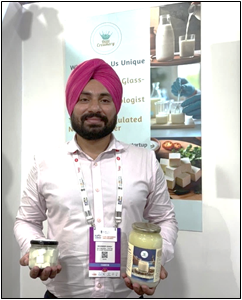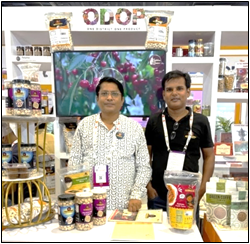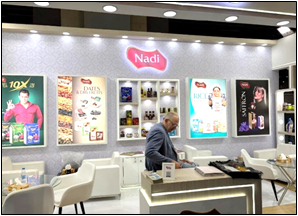Farmer's Welfare
Stories of Startups, Strength of Scale
World Food India 2025 Redefines India’s Role in Global Food Processing
Posted On: 03 OCT 2025 9:59AM
 When Devinder Singh started Dilli Creamery in a small corner of Vikaspuri, Delhi in 2024, his goal was simple but deeply personal, to bring back the authentic Punjabi household taste of paneer and dairy sweets that he had grown up with. With just 20 liters of milk a day and handmade batches of paneer, Singh built his venture around purity and tradition. Registering with FSSAI and supported by schemes aimed at small food processors, he slowly expanded his production. Dilli Creamery now produces 300-350 litres of milk, 20–25 kilograms of paneer and 40–50 kilograms of sweets and dairy products every day. For him, World Food India 2025 became more than just an exhibition. It was the stage where his homegrown brand stood shoulder to shoulder with global names, attracting buyers from across the world while staying true to its roots. His stall, in the Ministry of Animal Husbandry and Dairying pavilion and decorated with the familiar aroma of fresh dairy, drew curious international retailers who saw in Dilli Creamery a story of tradition meeting opportunity.
When Devinder Singh started Dilli Creamery in a small corner of Vikaspuri, Delhi in 2024, his goal was simple but deeply personal, to bring back the authentic Punjabi household taste of paneer and dairy sweets that he had grown up with. With just 20 liters of milk a day and handmade batches of paneer, Singh built his venture around purity and tradition. Registering with FSSAI and supported by schemes aimed at small food processors, he slowly expanded his production. Dilli Creamery now produces 300-350 litres of milk, 20–25 kilograms of paneer and 40–50 kilograms of sweets and dairy products every day. For him, World Food India 2025 became more than just an exhibition. It was the stage where his homegrown brand stood shoulder to shoulder with global names, attracting buyers from across the world while staying true to its roots. His stall, in the Ministry of Animal Husbandry and Dairying pavilion and decorated with the familiar aroma of fresh dairy, drew curious international retailers who saw in Dilli Creamery a story of tradition meeting opportunity.
This year’s edition of World Food India, held from September 25 to 28, 2025 in New Delhi, focused strongly on empowering startups and small food enterprises to scale globally. By showcasing India’s strength not just as the world’s largest producer of milk, onions, and pulses, but also as a rising player in processed food exports worth 49.4 billion dollars in 2024–25, WFI created opportunities for small enterprises to expand their global footprint. Partner and Focus Country pavilions, including New Zealand, Saudi Arabia, Germany, Japan, and Russia, provided startups with targeted B2B interactions.
 From the fields of the Darbhanga-Mithila region, where makhana has been nurtured for generations, came another remarkable journey. In December 2019, engineer-turned-entrepreneur Shravan K. Roy set up a small processing and packaging unit in Darbhanga with little more than determination and faith. At the time, he could handle only 100–150 kilograms a month, selling mostly in local markets. Resources were scarce, awareness was low, and every step felt like a struggle, but Roy believed that makhana from his homeland deserved recognition as a global superfood. Support from Startup India, Startup Bihar, and B-HUB incubation gave him mentorship, while MSME subsidies eased machinery costs and APEDA’s export schemes opened doors abroad. GST reforms further helped his brand move beyond Bihar into metros like Delhi, Mumbai, and Bangalore. Each scheme became a stepping stone, transforming a local dream into a growing national movement. Today, his venture, FT-MBA Makhana Wala, processes 4–6 tonnes every month, offering roasted, flavored, and premium-quality exports. As a G.I. (Geographical Indicator) Authorized User, the brand proudly carries the heritage of Mithila to the world. At World Food India 2025, Roy stood before global buyers not just as an entrepreneur but as the representative of thousands of farmers from his region, his brand a symbol of heritage, health, and hope.
From the fields of the Darbhanga-Mithila region, where makhana has been nurtured for generations, came another remarkable journey. In December 2019, engineer-turned-entrepreneur Shravan K. Roy set up a small processing and packaging unit in Darbhanga with little more than determination and faith. At the time, he could handle only 100–150 kilograms a month, selling mostly in local markets. Resources were scarce, awareness was low, and every step felt like a struggle, but Roy believed that makhana from his homeland deserved recognition as a global superfood. Support from Startup India, Startup Bihar, and B-HUB incubation gave him mentorship, while MSME subsidies eased machinery costs and APEDA’s export schemes opened doors abroad. GST reforms further helped his brand move beyond Bihar into metros like Delhi, Mumbai, and Bangalore. Each scheme became a stepping stone, transforming a local dream into a growing national movement. Today, his venture, FT-MBA Makhana Wala, processes 4–6 tonnes every month, offering roasted, flavored, and premium-quality exports. As a G.I. (Geographical Indicator) Authorized User, the brand proudly carries the heritage of Mithila to the world. At World Food India 2025, Roy stood before global buyers not just as an entrepreneur but as the representative of thousands of farmers from his region, his brand a symbol of heritage, health, and hope.
 Nadi Food, a German exhibitor at WFI, shared a highly positive experience at the event. According to their salesperson, the company has attended WFI as visitors since its inaugural edition, and this year the owner chose to participate as an exhibitor. They praised the Government of India for efficiently organizing the event on such a large scale and attracting a significant number of visitors. The representative noted that the strong interest from Indian businesses has encouraged them to explore opportunities and plan the commencement of operations in the country.
Nadi Food, a German exhibitor at WFI, shared a highly positive experience at the event. According to their salesperson, the company has attended WFI as visitors since its inaugural edition, and this year the owner chose to participate as an exhibitor. They praised the Government of India for efficiently organizing the event on such a large scale and attracting a significant number of visitors. The representative noted that the strong interest from Indian businesses has encouraged them to explore opportunities and plan the commencement of operations in the country.
As the curtains came down on September 28, World Food India 2025 had clearly delivered on its promise. It was not just a showcase but a platform that catalyzed startup growth, strengthened international business networks, and offered avenues for scaling Indian food enterprises globally. Over the course of 4 days, 26 leading domestic and global companies signed MoUs worth ₹1,02,046.89 crore, one of the largest investment announcements in India’s food processing sector, expected to generate over 64,000 direct jobs and benefit more than 10 lakh people indirectly. The agreements, involving major names like Reliance, Coca-Cola, Amul, Nestlé, and Tata Consumer Products, cover diverse segments including dairy, beverages, packaged foods, and ready-to-eat products, with investments spread across 18 states. Invest India facilitated the MoU signings, supporting the government’s vision of making India a global hub for food processing.
Over 10,500 B2B meetings, 261 government-to-government sessions, and 18,000 reverse buyer-seller meetings offered a structured environment for young and emerging businesses to explore partnerships, export opportunities, and joint ventures. The event’s dedicated zones, such as the Great Indian Food Street and innovation corners, enabled startups to showcase regional products, new flavours, and technology-driven solutions for packaging, cold storage, and food preservation, helping them attract investors and global collaborators.
References
Ministry of Food Processing Industries
https://www.pib.gov.in/PressNoteDetails.aspx?NoteId=155267&ModuleId=3
https://www.pib.gov.in/FeaturesDeatils.aspx?NoteId=155319&ModuleId=2
https://www.pib.gov.in/PressReleasePage.aspx?PRID=2172417
Stories of Startups, Strength of Scale
*****
SK/SM
(Features ID: 155329)
Visitor Counter : 264
Provide suggestions / comments
Read this release in:
Hindi